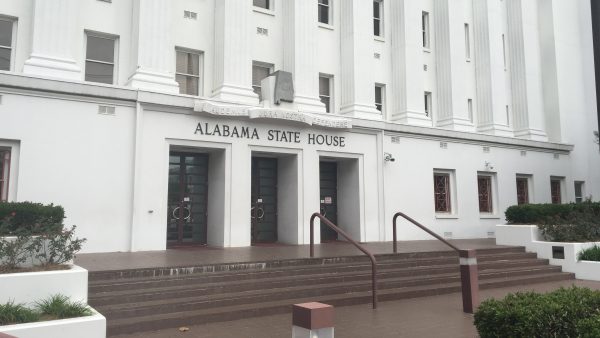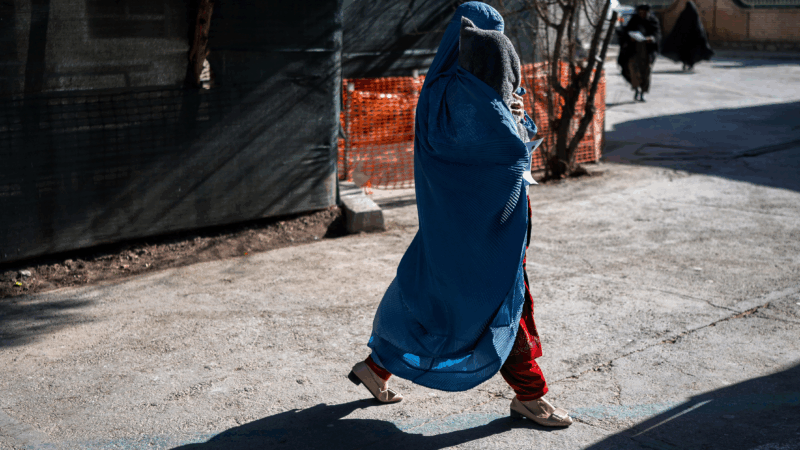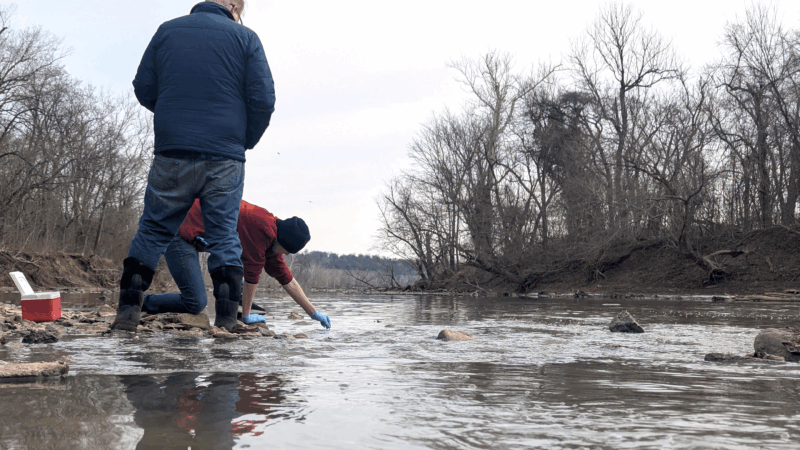Alabama’s Only High-School Freethinkers’ Club
 Birmingham — A recent national poll shows a vast increase in the number of non-religious Americans. Roughly a fifth are now atheist, agnostic, or “nothing in particular.” But polls also show non-believers are the least-trusted group in the country. So the trend is a prescription for some tension, tension that sometimes plays out in the nation’s schools. Our Southern Education Desk reporter Dan Carsen has more on one example — the story behind Alabama’s only high-school “freethinkers” club:
Birmingham — A recent national poll shows a vast increase in the number of non-religious Americans. Roughly a fifth are now atheist, agnostic, or “nothing in particular.” But polls also show non-believers are the least-trusted group in the country. So the trend is a prescription for some tension, tension that sometimes plays out in the nation’s schools. Our Southern Education Desk reporter Dan Carsen has more on one example — the story behind Alabama’s only high-school “freethinkers” club:
It’s not exactly pioneering journalism to report that Alabama is part of the Bible Belt. Even so, there are nonbelievers’ or “freethinkers'” clubs on college campuses around the state. But until recently — excluding one club that lasted from 1996 to 1997 at Shelby County’s Pelham High — there were none at the high-school level. It makes sense: For better or worse, most kids that age want to fit in. Very few would publicly go against bedrock beliefs held sacred by the community around them. But sixteen-year-old Duncan Henderson of Auburn is different.
“I had just ‘come out’ in seventh grade,” he says. “And I had a few friends that I knew were non-religious. And as we got older, we started hanging out more, and I was like, ‘you know what? I really want a group for us to not be badmouthed constantly by the majority of the school. So, I really want to start a group.'”
So Duncan tried to start a freethinkers’ club two years ago at Auburn Junior High. He wanted a safe social space for himself and like-minded classmates. But Duncan and his family say a former principal stonewalled it, which the administrator — who’s now with a different school system — denies outright. Regardless, Duncan got death threats from fellow students:
“One threatened to shoot me and every other atheist with a shotgun.”
Duncan and his family ultimately decided it wasn’t a serious threat and didn’t report it. But then there was the time a classmate tried to choke Duncan.
“I kinda kicked him, and he never touched me again,” he says matter-of-factly.
It’s probably a good thing Duncan is a big kid with a disarming way about him. He’s now founder and president of the Auburn High School Freethinkers’ Club, the only such high school club in Alabama. Things have calmed down and the club is established, thanks partly to principal Dr. Todd Freeman, the club’s sponsor.
Freeman says, “Our kids have a right to meet. And they have a right to establish a club, and it’s not my prerogative to necessarily agree or disagree with positions of clubs, but it is my prerogative and responsibility to make sure they have the right to have the club. I could see where there would be resistance, but it’s not really a question because it’s law.”
Then Freeman, who happens to be a devout Christian, adds, “Duncan knows my particular spiritual beliefs as a Christian and so do his mom and dad, whom we have a great relationship with, and work very well with. They’re just very nice folks.”
Even if they didn’t get along, the 1984 Equal Access Act says any school club has to have the same access to meeting spaces and other resources as other clubs at a federally funded school. The law was originally promoted by religious groups who wanted prayer clubs and the like. Now, it also protects LGBT-themed organizations, freethinkers clubs, and more.
At Auburn High, that protection applies to the Fellowship of Christian Athletes, Student Outreach for Christ, or any other of the school’s 54 clubs. But Principal Freeman doesn’t support the Freethinkers club just to follow the law. He says he’s been impressed with the club’s “intellectually stimulating conversations.” He adds, “One of things that was an affirmation to me is that it was not a club that had an intent to disparage or denigrate other groups, or Christians. If you really embrace whatever your belief systems are, there’s commonalities that we treat people respectfully. And I saw that in those meetings.”
Duncan says the club gives him and a half-dozen other students that kind of safe, respectful space. “We kinda just want a place that we can all talk, and talk about controversial things,” he says. “I
mean, religion, science, just … all get a long and talk and have fun, without constantly being looked down on by other people. And on top of that, eliminate stereotypes.”
Including the one Duncan says is preached in a friend’s church — that atheists are manifestations of the Devil. Some former club members have had to bow out because of the stigma and pressure from friends and family. Duncan’s dad Greg Henderson chimes in with some thoughts on that:
“Most religious people don’t think they know atheists. And they have this idea in their head about … they’re horrible people, they’re immoral, they’re cruel. They just don’t act right. And, it’s … it’s just not true.”
What is indisputable is a rise in high-school freethinkers’ clubs all across the country: This time last year, there were roughly a dozen. Now there are more than 60. Not one of the religious scholars or church leaders I spoke with disputed the clubs’ legal right to exist. Some actually see the trend as a wake-up call and an opportunity.
According to Dr. Randy Brinson, chairman of the Alabama branch of the Christian Coalition, “We need to be more relevant in the communities. We’ve become more cloistered. We do not have enough time to spend one-on-one to build relationships with people. People don’t even know who their next-door neighbor is. I think this in an indictment [of how we] Christians are interacting with our community at large.”
But for Brinson, the trend in young non-believers has bigger implications, too. “It speaks in Revelations about people turning away from their traditional beliefs,” he says. “I think most people would believe, yes, that’s probably part of the end times and we’re very close to the end times.”
Brinson also worries that adults with agendas are partly behind the rise in youth freethinkers’ groups. Duncan has read some of the so-called “New Atheists” — Sam Harris, Christopher Hitchens, Richard Dawkins — and was getting advice from “Friendly Atheist” blogger Hemant Mehta. And now, a national group called the Secular Student Alliance is supporting the club. But Duncan’s earlier influences were closer to home. Duncan’s father describes his own stance like this:
“I grew up very religious, and just over time, came to realize I just don’t believe any of this anymore. But at the point where they’re going to Sunday school and being taught things that I just don’t believe anymore, I had to make a decision. I can’t be a hypocrite about this. I can’t just go with the flow.”
In April of 2011 Duncan was featured in Nick News’s documentary “Freedom To Believe, Or Not.”
Duncan’s father and others see him as a trailblazer — someone shouldering challenges so a coming wave of less-religious students won’t have to. Duncan gets that. But mainly, despite the attention and the controversy, he thinks of himself as a regular, happy kid who loves lacrosse and tennis and playing with his brother and his friends.
The economy slowed in the last 3 months of the year — but was still solid in 2025
The U.S. economy grew 2.2% in 2025, a modest slowdown from 2.4% the previous year. GDP gains were fueled by solid consumer spending and business investment.
Ali Akbar, who’s sold newspapers on the streets of Paris for 50 years, is now a knight
For decades, Ali Akbar has sold papers on the Left Bank of Paris. Last month, France gave the beloved 73-year-old immigrant from Pakistan one of its highest honors — and his neighborhood is cheering.
Bill limiting environmental regulations goes to the governor’s desk
President Trump has taken steps to roll back environmental regulations. Some of that same action is taking place in statehouses, including Alabama's. Lawmakers gave final passage this week to a bill that would ban the state from enacting environmental rules more stringent than those at the federal level. That's where we start our weekly legislative update with Todd Stacy, host of Capitol Journal on Alabama Public Television.
For years the Taliban told women to cover up in public. Now they’re cracking down
At hospitals, at seminaries and on buses, the Taliban is stepping up enforcement of rules on women's dress in the city of Herat.
What I learned watching every sport at the Winter Olympics
Sit down with pop culture critic Linda Holmes as she watches the 2026 Winter Games. She is exhausted by cross-country, says "ow ow ow" during moguls, and makes the case, once and for all, for curling.
Scientists worry about lasting damage from Potomac sewage spill
Drinking water around the District of Columbia hasn't been contaminated. But scientists say the environmental damage could be severe.






